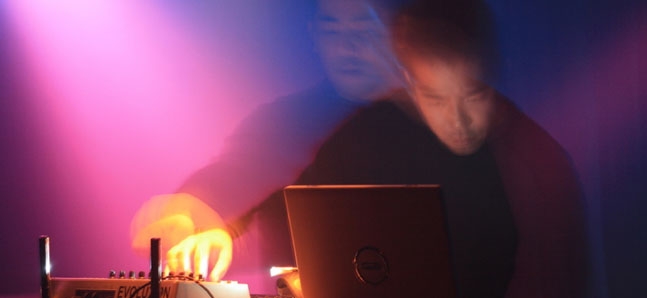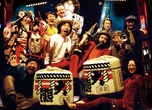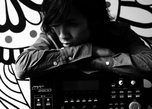
Posted: Thu Feb 10 2011
Berlin has become the heart of Europe’s techno scene, and many consider its most influential club to be Berghain. Occasionally manning the decks, you’ll find a prolific Japanese artist, afforded generous acclaim by some of techno’s biggest names, such as Len Faki, resident DJ at Berghain, and veteran DJ Luke Slater. He calls himself A. Mochi, and has released countless 12-inches on labels all over the world, as well as his first album Primordial Soup at the end of 2010 on Len Faki’s label Figure. He says, rather humbly, that his current success came about before he even realized it. For those young artists looking to emulate his career achievements, it is perhaps this lack of pretension that has been the key. What we see behind his relaxed attitude is a true love of sound. We live in a time where if you have a passion for music, and an awareness of how to produce it well, you can use the Internet to take on the world. A. Mochi is living proof.
What brought you to techno in the first place?
I didn’t have any particular aims, but when I was at university I did things like Metallica tributes and there was always a drum machine quite close at hand. I became quite attached to it. It was right around the time when clubs were really beginning to take off, in the late nineties, and a friend who was into clubbing told me what kind of places there were and took me along to some. It was like the sounds I knew from drum machines and the sound of techno seemed to match. From that point I gravitated more and more towards that kind of music.
So you got into techno as an extension of what you were doing for fun?
After that I started making music using freeware. I would also occasionally go to events at small clubs if a friend invited me. From around 2000 a good friend let me be a part of the regular parties that were held on weekdays at Maniac Love. It was a club I went to a lot, and I’d always wanted to be able to stand in the DJ booth there. From that point it became a regular thing, and that’s where it all began. Little by little the connections I had from the club led to me being asked to play at other events. Honestly, before I knew it, it was a monthly thing. I also wasn’t thinking at all about releasing any music then.
When did you start to think about releasing some of your work?
That also wasn’t something I was thinking about myself. One of the organizers at the time said to me, ‘You could probably release something sometime soon, couldn’t you? It’d be good if you could release a record, wouldn’t it?’ That’s when it started — making songs and sending demos off to record labels overseas and things.
So it seems like you were simply performing and making music for your own enjoyment. Around what time was that?
I think it was about 2003. It was just around that time that I was making a lot of hardcore techno tracks. At the point when I’d finally gotten a contract and was going to be able to release a record, the industry was still feeling the shock of Prime (one of the big electronic record distributors at the time) going bankrupt and my record label said to me, ‘We want to put your record out, but we can’t distribute any more and we’re stopping label operations.’ At the time I saw on the Web that Luke Slater had started his own label, so I sent him a demo and I got a reply straight away. It was around 2006 or 2007 that my record was released. Actually, two or three years before that I’d had a [different] contract, but that label had disappeared and the songs that hadn’t been released came out on two consecutive records on a label I’d never heard of [laughs]. There were times when it was only when [a promo] came from the distributor that I knew something had been put out.
So in the first half of the 2000s, you were performing steadily, and in the latter half, the pace of your releases was picking up.
I was really happy that my songs were made into 12-inches, and I thought that if I was going to be making songs then I wanted to keep on releasing them.
You recently had a release on the Berlin label Figure. How was it that you came to meet the label head, Len Faki?
Originally there was talk that I’d release another two records on Luke Slater’s label, but the analogue distributor there also went bankrupt, so all talk was stopped [laughs]. Len Faki, who I’d been a fan of, was one of the people doing remixes for that record and when I listened to his sound, I thought there were similarities in our tastes. I sent him some music, and he said he wanted to use it on a release that was both a mix CD and a 12-inch. It was one of Len Faki’s mix CDs in the Berghain series. The sale of the mix CD was postponed a little, and we were discussing what to do and he said it’d be good if I added a few more songs for my own release on Figure, and my name wouldn’t be buried amongst the names of other more famous artists. That’s how I came to release work on Figure.
So the complications and difficulties that came up, like the collapse of the distributors, actually worked out in your favour, didn’t they? Did you find your tour of Europe in Autumn 2010 to be very different from your experiences in Japan?
The crowds were like a group of the kind of people who would really stick out in Japan as being really energetic and loud [laughs]. There are people who just keep on dancing for hours, without saying a word. Also, I played at a big festival in France, one that was on a similar scale to Womb Adventure here in Japan, and there were a lot of people who were pinned down by the security guards and thrown out [laughs]. But everywhere I go, the reactions to the music I play are fantastic.
How was Berghain?
It was fun. But the week before I’d been at a big festival with Aphex Twin, Adam Beyer and Chris Liebing, and I was on just before Len Faki, who was headlining, and we were playing in front of 10,000 people, so compared to that, I was pretty chilled out when I was on at Berghain.
That festival had an amazing lineup, didn’t it?
Berghain is full of people just having fun and dancing, irrespective of who the DJ is, or what song is on. It’s as if you got all the people who are loud, energetic and stand out and put them in one of Japan’s biggest clubs. Basically, it was an easy place to play. Actually, that reminds me — I always hear people say that in clubs overseas people don’t face the DJ booth, but when I performed I thought, ‘But most of the people are facing me!’
When you play it can be like a live performance too though, can’t it?
But even for a regular DJ set it was like that. Particularly in reasonably big clubs, where the booth is properly set up, it seemed to me like most people were facing the DJ when they were dancing.
When you come back to Japan after working overseas, is there anything you notice afresh, like things that you find interesting or different about Tokyo?
I think it’s amazing how you can go shopping any time of the day, like being able to easily go to a convenience store because they’re open 24 hours a day. Even in the suburbs there are convenience stores. I think that’s what I was amazed by all over again.
You’ve released records on the labels of some of techno’s top artists, do you ever meet up with them?
I see Len Faki and Luke Slater when they come to Japan, but with Francois (Kevorkian) its just like I’m one of many different people he is shaking hands with. (laughs) I’ve never met Sven Vath or Dubfire. There’s often only email contact between us. I’ve never really thought, ‘Now I’m going to set my sights on this and make it that way.’ I’ve just kept on doing what was within my abilities and been able to put out records like this. It really is like everything has happened without my even noticing it.
Incidentally, about your first album, which you released in 2010, what were the themes you had in mind when you were making it?
I had a bunch of songs already made, and all I was thinking was that it would be good to be able to choose from them. Though I was making it during a period when my musical tastes were changing, so on the album there is a sense of what I have done so far and what I will do from now on. Like the first track on the album. It’s probably close to what I’ll be producing in the future. You could call it completely typical hardcore techno.
Also, was there a reason it was released when it was?
Originally, after I’d released a work on Figure there was a plan to do a European tour, and I was told that it would be good to start work on my next release. After that, talk of the European tour would come up again, but it would come and go. But the idea that the tour should be a tour of a new release was so persuasive that we started to talk about doing an album to make it possible. Ultimately, there weren’t any songs that really suited listening at home, so we planned to put out two 12-inches, and then we split it into three 12-inches.
Do you ever make any songs with completely different compositions to that kind of dance music?
No, the minute I do make that kind song, the quality just drops.
What are your plans for the future?
A remix of the album I put out on Figure is due to come out in spring. The artists who will be doing the remixes are still a secret, but it seems like Len Faki and other artists associated with the label will be involved.
A.Mochi will DJ at Saloon at UNIT, Friday Feb 11. Primordial Soup is on sale now. Click here for his official website
Tweets
- About Us |
- Work for Time Out |
- Send us info |
- Advertising |
- Mobile edition |
- Terms & Conditions |
- Privacy policy |
- Contact Us
Copyright © 2014 Time Out Tokyo













Add your comment